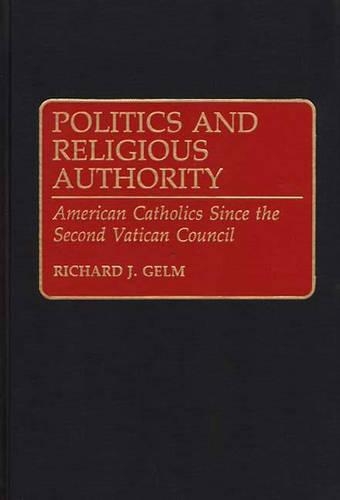
Politics and Religious Authority: American Catholics Since the Second Vatican Council
(Hardback)
Publishing Details
Politics and Religious Authority: American Catholics Since the Second Vatican Council
By (Author) Richard Gelm
Bloomsbury Publishing PLC
Praeger Publishers Inc
30th October 1993
United States
Classifications
Tertiary Education
Non Fiction
282
Physical Properties
Hardback
168
Width 156mm, Height 235mm
454g
Description
This study assesses the political effects of the Second Vatican Council on the politics of American Catholics. After discussing Catholic contributions to political development since the Middle Ages, Gelm argues that changes since Vatican II signify a major departure from the Church's authoritarian and anti-democratic actions of the past. Among the most significant changes has been the increased political activism of America's Catholic bishops. Gelm has surveyed the political attitudes of U.S. Catholic bishops and investigated their political values and motives. Emphasizing the way in which religion adapts and changes, the study provides a valuable consideration of the tensions within the U.S. Catholic Church since Vatican II and the political impact of Vatican II.
Reviews
"This book investigates the poltical effects in the United States of the Second Vatican Council of the Roan Catholic Church.... [Gelm] restates the now familiar secularization thesis--that as societies modernize, religion declines in influence. Currently, this thesis is questioned by many who note that religion has not declined in the twentieth century, but has, instead, undergone a powerful resurgence... Gelm's novel contribution to thus debate is to ask: what if religion, rather than remaining static, changes and adapts to the new realities of modern political societies...This bok deserves wide reading--especially by American Catholic bishops themselves."-Journal of Church and State
A good example of the interdisciplinary nature of Catholic studies and religious studies in the 1990s.-Choice
This book investigates the poltical effects in the United States of the Second Vatican Council of the Roan Catholic Church.... [Gelm] restates the now familiar secularization thesis--that as societies modernize, religion declines in influence. Currently, this thesis is questioned by many who note that religion has not declined in the twentieth century, but has, instead, undergone a powerful resurgence... Gelm's novel contribution to thus debate is to ask: what if religion, rather than remaining static, changes and adapts to the new realities of modern political societies...This bok deserves wide reading--especially by American Catholic bishops themselves.-Journal of Church and State
"A good example of the interdisciplinary nature of Catholic studies and religious studies in the 1990s."-Choice
Author Bio
RICHARD J. GELM is Assistant Professor of Political Science at the University of La Verne.
